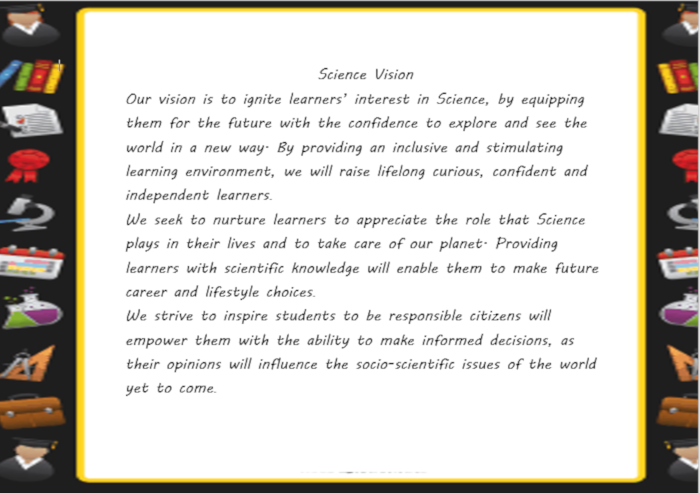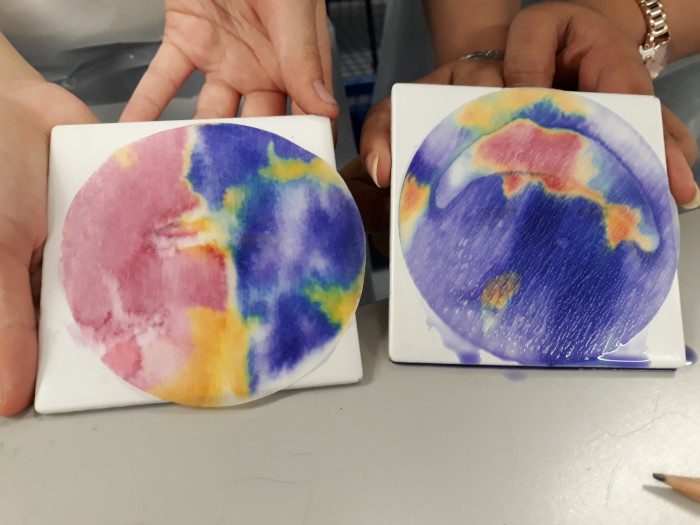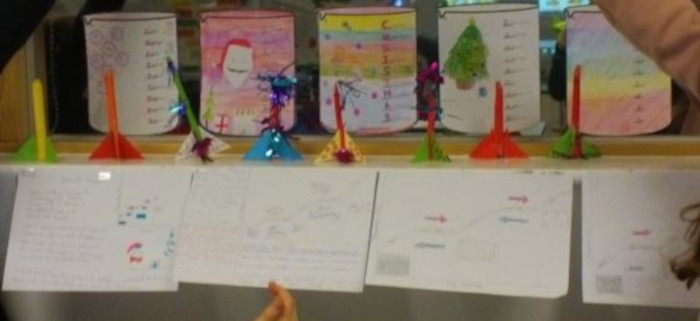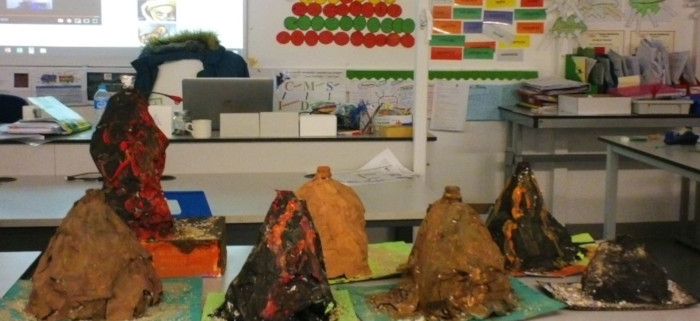

Our intention:
- Leaners are self-aware, able to recognise when they are learning well, and are empowered to reflect on why this is so.
- Learners can recognise obstacles to their own learning and are equipped to change their learning strategies.
- Empower learners to regulate their emotions in relation to their learning, building resilience and enhancing wellbeing.
- Learners are conscious of the learning process and are aware of when they have thought differently about something.
Key Stage 2 and 3

Key Stage 2
At KS2 the Science department offers a science lab experience through an after school Science club and through its transition programme.
Children from local primary schools become familiar with Science equipment used at Queen Katharine Academy from the mini experiments carried out.
|
|
|
|
|
|
Key Stage 3
Year 7 Autumn Term
- Introduction to science lab and skills
- Cellular components
- Behaviour of particles
Year 7 Spring Term
- Forces
- Sound
- Chemical reactions
- Light and space
Year 7 Summer Term
- Light
- Space
- Plant and animal reproduction
- Science fair
Homework is set every week on www.century.tech
Useful website: https://www.kerboodle.com
Year 8 Autumn Term
- Health and lifestyle
- The Periodic Table
- Electricity and magnetism
Year 8 Spring Term
- Biological processes
- Separation techniques
- Ecosystems and adaptations
- Metals and acids
- Inheritance
- The Earth
- Science fair
Homework is set every week on www.century.tech
Useful website: https://www.kerboodle.com
Year 9 curriculum
The year 9 curriculum introduces science GCSE. The spiral curriculum continues from years 7 & 8 and introduces one new topic, Quantitative Chemistry, fundamental to year 10.
Year 9 topics are:
Year 9 autumn term
- Cell Biology
- Atomic Structure
- Energy
Year 9 spring term
- Particle model
- Quantitative Chemistry
Year 9 Summer Term
- Chemical Changes
- Bioenergetics
Homework is set every week on www.century.tech
Useful website: https://www.kerboodle.com
Key Stage 4

Here at Queen Katharine Academy AQA Science is delivered at Key Stage 4. This Science specification offers something to every student with its suite of qualifications catering for all abilities and all aspirations. The Biology, Chemistry and Physics content is presented clearly, in a logical teaching order. We believe this course support our students with the basics and then follows through with those students that aspire to Level 3 qualifications. The courses taught are:
Trilogy Combined Science
|
GCSE AQA Trilogy Combined Science |
||
|
Exam Board: AQA |
Specification Code: 8462 |
Overview: The new science syllabus has something to offer every student. From a trainee chef to a nuclear physicist, a construction apprentice to a cancer researcher. The course covers everyone needs of the relevant scientific knowledge. |
|
Course breakdown: Biology Paper 1:
Biology 2
Plus Chemistry paper 1:
Chemistry paper 2:
Plus Physics Paper 1:
Physics Paper 2:
Equipment needed: Scientific Calculator Black pen Pencil Ruler |
||
|
Useful websites/ resources: https://www.kerboodle.com https://www.century.tech/ http://www.bbc.co.uk |
Deadlines: Required Practical Coursework to be completed by April 2018. Questions in the written exams will draw on the knowledge and understanding students have gained by carrying out the practical activities. These questions will count for at least 15% of the overall marks for the qualification. Many of our questions will also focus on investigative skills and how well students can apply what they know to practical situations often in novel contexts.
|
|
|
Homework expectations: Three homework per week: one from Biology, Chemistry and Physics. |
How can parents help? Check homework is being completed at home, rather than in school during tutor time and breaks. Encourage your child to attend the appropriate support classes after school for the areas they are having difficulty with. |
|
|
Revision tips: Start early making revision notes, ‘que’ cards and mind maps. Que cards are available free from your science teacher.
|
Any other information: http://filestore.aqa.org.uk/resources/science/AQA-KS4-SCIENCE-COMP-GUIDE.PDF Science support classes start in September and are every Tuesday from 3.15pm- 4.00pm. A list of the topics will be published to help your child decide which classes are most appropriate for them. |
|
Triple Separate Science (Biology, Chemistry and Physics).
|
GCSE Separate Biology |
||
|
Exam Board: AQA |
Specification Code: 8641 |
Overview: The specification is based on a series of topics related to the living world and relevant to students. It is designed to help them understand how Science can be used to explain the world in which they live and the impact humans have. It is suitable for students of all abilities, whether they intend further study in Science or not. It can open the doors to future careers in Medicine and the Life Sciences. |
|
Course breakdown: Biology Paper 1:
Biology 2
Equipment needed: Scientific Calculator Black pen Pencil Ruler |
||
|
Useful websites/ resources: https://www.kerboodle.com https://www.century.tech/ http://www.bbc.co.uk
|
Deadlines: Required Practical Coursework to be completed by April 2018. Questions in the written exams will draw on the knowledge and understanding students have gained by carrying out the practical activities. These questions will count for at least 15% of the overall marks for the qualification. Many of our questions will also focus on investigative skills and how well students can apply what they know to practical situations often in novel contexts.
|
|
|
Homework expectations: One homework from Biology |
How can parents help? Check homework is being completed at home, rather than in school during tutor time and breaks. Encourage your child to attend the appropriate support classes after school for the areas they are having difficulty with.
|
|
|
Revision tips: Start early making revision notes, que cards and mind maps. Que cards are available free from your science teacher.
|
Any other information: http://filestore.aqa.org.uk/resources/science/AQA-KS4-SCIENCE-COMP-GUIDE.PDF Science support classes start are every Tuesday from 3.15pm- 4.00pm. A list of the topics will be published to help your child decide which classes are most appropriate for them.
|
|
|
GCSE Separate Chemistry |
||
|
Exam Board: AQA |
Specification Code: 8642 |
Overview: The specification is structured in a way that starts with the fundamental ideas in Chemistry, putting the building blocks in place. This enables students to develop an understanding of topics such as chemical structures and their properties, chemical reactions and how to analyse substances. Many of the materials considered are substances that students will come across in their daily lives like drinking water, vegetable oils and metals. This helps engage students by putting their learning in context. |
|
Course breakdown: Chemistry Paper 1:
Chemistry 2
Equipment needed: Scientific Calculator Black pen Pencil Ruler |
||
|
Useful websites/ resources: https://www.kerboodle.com https://www.century.tech/ http://www.bbc.co.uk
|
Deadlines: Required Practical Coursework to be completed by April 2018. Questions in the written exams will draw on the knowledge and understanding students have gained by carrying out the practical activities. These questions will count for at least 15% of the overall marks for the qualification. Many of our questions will also focus on investigative skills and how well students can apply what they know to practical situations often in novel contexts.
|
|
|
Homework expectations: One homework from Chemistry |
How can parents help? Check homework is being completed at home, rather than in school during tutor time and breaks. Encourage your child to attend the appropriate support classes after school for the areas they are having difficulty with.
|
|
|
Revision tips: Start early making revision notes, ‘que’ cards and mind maps. Que cards are available free from your science teacher.
|
Any other information: http://filestore.aqa.org.uk/resources/science/AQA-KS4-SCIENCE-COMP-GUIDE.PDF Science support classes start are every Tuesday from 3.15pm- 4.00pm. A list of the topics will be published to help your child decide which classes are most appropriate for them.
|
|
|
GCSE Separate Physics |
||
|
Exam Board: AQA |
Specification Code: 8643 |
Overview: The specification is designed to give students the tools and concepts they need to be able to construct a scientific approach to solving problems. Students will learn to ask and answer questions about the fundamental laws that govern natural phenomena. Students are likely to be engaged by the aspects of the specification that they can relate to their everyday life such as the efficiency of electrical appliances and braking distances as well as larger concepts like nuclear fission and fusion and evidence of the Big Bang
|
|
Course breakdown: Chemistry Paper 1:
chemistry 2
Equipment needed: Scientific Calculator Black pen Pencil Ruler |
||
|
Useful websites/ resources: https://www.kerboodle.com https://www.century.tech/ http://www.bbc.co.uk
|
Deadlines: Required Practical Coursework to be completed by April 2018. Questions in the written exams will draw on the knowledge and understanding students have gained by carrying out the practical activities. These questions will count for at least 15% of the overall marks for the qualification. Many of our questions will also focus on investigative skills and how well students can apply what they know to practical situations often in novel contexts.
|
|
|
Homework expectations: One homework from Physics |
How can parents help? Check homework is being completed at home, rather than in school during tutor time and breaks. Encourage your child to attend the appropriate support classes after school for the areas they are having difficulty with.
|
|
|
Revision tips: Start early making revision notes, ‘que’ cards and mind maps. Que cards are available free from your science teacher.
|
Any other information: http://filestore.aqa.org.uk/resources/science/AQA-KS4-SCIENCE-COMP-GUIDE.PDF Science support classes start are every Tuesday from 3.15pm- 4.00pm. A list of the topics will be published to help your child decide which classes are most appropriate for them.
|
|
Topics covered in Year 10 Trilogy Combined Science and Separate Triple Sciences:
- Cell Biology review (stretch and challenge)
- Atomic Structure review (stretch and challenge)
- Energy review (stretch and challenge)
- Organisation
- Quantitative Chemistry review (stretch and challenge)
- Electricity
- Bioenergetics review (stretch and challenge)
- Chemical Changes review (stretch and challenge)
- Particle Model review (stretch and challenge)
- Atomic Structure review (stretch and challenge)
- Energy changes
- Bioenergetics review (stretch and challenge)
- Rates of reaction
Topics covered in Year 11 Trilogy Combined Science and Separate Triple Sciences:
- Homeostasis
- Organic Chemistry
- Forces
- Year 11 mock exam Paper 1 preparation of the year 10 topics review (stretch and challenge)
- Ecology
- Analysis
- Waves
- Ecology
- Using Resource Magnetism
- Space (Separate Physics only)
- Year 11 mock exam Paper 2 preparation of the year 11 topics review (stretch and challenge)
- Revision programme for Paper 1 and 2 review (stretch and challenge)
Key Stage 5

At Key Stage 5 we deliver Advanced Edexcel Biology, Chemistry and Physics Sciences. Edexcel A level Sciences give students the chance to develop intellectually as they explore their Sciences in great depth. Each advanced level Science assess knowledge, skills and understanding that is needed by students planning to progress to undergraduate study in higher education institutions.
AS Level Biology

Specification codes: 8BI0
Topics taught in year 12 and examined on Paper 1:
Core Cellular Biology and Microbiology
Paper code: 8BI0/01
Overview of content
This paper will examine the following topics:
- Topic 1: Biological Molecules
- Topic 2: Cells, Viruses and Reproduction of Living Things.
Overview of assessment
50% of the total qualification
Externally assessed
- Assessment is 1 hour 30 minutes.
- The paper consists of 80 marks.
- The paper may include multiple-choice, short open, open-response, calculations and extended writing questions.
- Overall, a minimum of 10% of the marks across the three papers will be awarded for mathematics at Level 2 or above.
- The paper will include questions that target the conceptual and theoretical understanding of experimental methods.
Topics taught in year 12 and examined on Paper 2:
Core Physiology and Ecology
50% of the total qualification
Overview of content
This paper will examine the following topics:
- Topic 3: Classification and Biodiversity
- Topic 4: Exchange and Transport.
Overview of assessment
- Externally assessed
- Assessment is 1 hour 30 minutes.
- The paper consists of 80 marks.
- The paper may include multiple-choice, short open, open-response, calculations and extended writing questions.
- Overall, a minimum of 10% of the marks across the three papers will be awarded for mathematics at Level 2 or above.
- The paper will include questions that target the conceptual and theoretical understanding of experimental methods.
A Level Biology

Specification codes: 8BI0
Topics taught in year 13 and examined on Paper 1:
Advanced Biochemistry, Microbiology and Genetics
- Topic 1: Biological Molecules
- Topic 2: Cells, Viruses and Reproduction of Living Things
- Topic 3: Classification and Biodiversity
- Topic 4: Exchange and Transport
- Topic 5: Energy for Biological Processes
- Topic 6: Microbiology and Pathogens
- Topic 7: Modern Genetics.
Overview of assessment
Paper code 9BIO/01 and is 30% of the total qualification
Externally assessed
- Assessment is 1 hour 45 minutes.
- Paper 1 consists of 90 marks.
- Paper 1 may include multiple-choice, short open, open-response, calculations and extended writing questions.
- Overall, a minimum of 10% of the marks across the three papers will be awarded for mathematics at Level 2 or above.
Evolution and Ecology
*Paper code: 9BI0/02
Topics taught in year 13 and examined on Paper 2:
Advanced Physiology, Evolution and Ecology
This paper will examine the following topics:
- Topic 1: Biological Molecules
- Topic 2: Cells, Viruses and Reproduction of Living Things
- Topic 3: Classification and Biodiversity
- Topic 4: Exchange and Transport
- Topic 8: Origins of Genetic Variation
- Topic 9: Control Systems
- Topic 10: Ecosystems.
Overview of assessment
Paper code 9BIO/02 and is 30% of the total qualification
- Externally assessed
- Assessment is 1 hour 45 minutes.
- Paper 2 consists of 90 marks.
- Paper 2 may include multiple-choice, short open, open-response, calculations and extended writing questions.
- Overall, a minimum of 10% of the marks across the three papers will be awarded for mathematics at Level 2 or above.
Topics taught in year 13 and examined on Paper 3
- This paper will include questions from Topics 1−10.
Overview of assessment
Paper code 9BIO/03 and is 40% of the total qualification
Externally assessed
- Assessment is 2 hours 30 minutes.
- Paper 3 consists of 120 marks.
- Paper 3 may include short open, open-response, calculations and extended writing questions.
- The paper will include synoptic questions that may draw on two or more different topics.
- Overall, a minimum of 10% of the marks across the three papers will be awarded for mathematics at Level 2 or above
- The paper will include questions that target the conceptual and theoretical understanding of experimental methods.
Science Practical Endorsement**
Practical skills taught in year 13 and examined on Paper 3:
Internally assessed and externally monitored by Pearson.
Overview of content
The assessment of practical skills is a compulsory requirement of the course of study for
A level biology. It will appear on all students’ certificates as a separately reported result, alongside the overall grade for the qualification.
Students must carry out a minimum of 12 practical activities which, from the prescribed subject content.
The practical activities prescribed as the "core practicals" provide opportunities for demonstrating competence in all the skills identified, together with the use of apparatus and techniques for each subject.
Overview of assessment of the Core Practical
- Determine the acceleration of a freely falling object.
- Determine the electrical resistivity of a material.
- Determine the e.m.f. and internal resistance of an electrical cell.
- Use a falling-ball method to determine the viscosity of a liquid.
- Determine the Young modulus of a material.
- Determine the speed of sound in air using a 2-beam oscilloscope, signal generator, speaker and microphone.
- Investigate the effects of length, tension and mass per unit length on the frequency of a vibrating string or wire.
- Determine the wavelength of light from a laser or other light source using a diffraction grating.
- Investigate the relationship between the force exerted on an object and its change of momentum.
- Use ICT to analyse collisions between small spheres, e.g. ball bearings on a table top.
- Use an oscilloscope or data logger to display and analyse the potential difference (p.d.) across a capacitor as it charges and discharges through a resistor.
- Calibrate a thermistor in a potential divider circuit as a thermostat.
- Determine the specific latent heat of a phase change.
- Investigate the relationship between pressure and volume of a gas at fixed temperature.
- Investigate the absorption of gamma radiation by lead.
- Determine the value of an unknown mass using the resonant frequencies of the oscillation of known masses.
Science Practical Endorsement
Paper code: 9BI0/04
The assessment of practical skills is a compulsory requirement of the course of study for A level Biology. It will appear on all students’ certificates as a separately reported result, alongside the overall grade for the qualification.
Students must carry out a minimum of 12 practical activities.
Students' practical work will be assessed by teachers, using common practical assessment criteria (CPAC) that are consistent across exam boards.
Students who demonstrate the required standard across all the requirements of the CPAC will receive a ‘pass’ grade.
Students may work in groups but teachers who award a pass to their students need to be confident of individual students’ competence.
The correct application of CPAC to students' work will be monitored through a system of visits to centres.
AS Level Chemistry

Specification codes: 8CH0
Topics taught in year 12 and examined on Paper 1:
Core Inorganic and Physical Chemistry
Paper code: 8CH0/01
Overview of content
This paper will examine the following topics.
- Topic 1: Atomic Structure and the Periodic Table
- Topic 2: Bonding and Structure
- Topic 3: Redox I
- Topic 4: Inorganic Chemistry and the Periodic Table
- Topic 5: Formulae, Equations and Amounts of Substance
Overview of assessment
50% of the total qualification
Externally assessed
- Assessment is 1 hour 30 minutes.
- The paper consists of 80 marks.
- The paper may include multiple-choice, short open, open-response, calculations and extended writing questions.
- Overall, a minimum of 20% of the marks across the three papers will be awarded for mathematics at Level 2 or above.
- Some questions will assess conceptual and theoretical understanding of experimental methods.
Topics taught in year 12 and examined on Paper 2:
Core Organic and Physical Chemistry
Paper code: 8CH0/02
Overview of content
This paper will examine the following topics:
- Topic 2: Bonding and Structure
- Topic 5: Formulae, Equations and Amounts of Substance
- Topic 6: Organic Chemistry I
- Topic 7: Modern Analytical Techniques I
- Topic 8: Energetics I
- Topic 9: Kinetics I
- Topic 10: Equilibrium I
Overview of assessment
50% of the total qualification
Externally assessed
- Assessment is 1 hour 30 minutes.
- The paper consists of 80 marks.
- The paper may include multiple-choice, short open, open-response, calculations and extended writing questions.
- Overall, a minimum of 20% of the marks across the three papers will be awarded for mathematics at Level 2 or above.
- Some questions will assess conceptual and theoretical understanding of experimental methods.
A Level Chemistry

Specification codes: 9CH0
Advanced Chemistry
*Paper code: 9CH0/01
30% of the
Overview of content
Topics taught in year 13 and examined on Paper 1:
Advanced Inorganic and Physical Chemistry
Paper code: 9CHO/01
- Topic 1: Atomic Structure and the Periodic Table
- Topic 2: Bonding and Structure
- Topic 3: Redox I
- Topic 4: Inorganic Chemistry and the Periodic Table
- Topic 5: Formulae, Equations and Amounts of Substance
- Topic 8: Energetics I
- Topic 10: Equilibrium I
- Topic 11: Equilibrium II
- Topic 12: Acid-base Equilibria
- Topic 13: Energetics II
- Topic 14: Redox II
- Topic 15: Transition Metals
Overview of assessment
30% of the total qualification
Externally assessed
- Assessment is 1 hour 45 minutes.
- The paper consists of 90 marks.
- The paper may include multiple-choice, short open, open-response, calculations and extended writing questions.
- Overall, a minimum of 20% of the marks across the three papers will be awarded for mathematics at Level 2 or above.
Paper 2: Advanced Organic and Physical Chemistry
Topics taught in year 13 and examined on Paper 2:
Advanced and Organic and Physical Chemistry
Paper code: 9CH0/02
- Topic 2: Bonding and Structure
- Topic 3: Redox I
- Topic 5: Formulae, Equations and Amounts of Substance
- Topic 6: Organic Chemistry I
- Topic 7: Modern Analytical Techniques I
- Topic 9: Kinetics I
- Topic 16: Kinetics II
- Topic 17: Organic Chemistry II
- Topic 18: Organic Chemistry III
- Topic 19: Modern Analytical Techniques II
Overview of assessment
30% of the total qualification
Externally assessed
- Assessment is 1 hour 45 minutes.
- The paper consists of 90 marks.
- The paper may include multiple-choice, short open, open-response, calculations and extended writing questions.
- Overall, a minimum of 20% of the marks across the three papers will be awarded for mathematics at Level 2 or above.
Paper 3: General and Practical Principles in Chemistry and Practical Principles in Chemistry code: 9CH0/03
Topics taught in year 13 and examined on Paper 3:
General and Practical Principles in Chemistry
Paper code: 9CH0/03
40% of the total qualification
Overview of content
- Questions in this paper may draw on any of the topics in this specification.
- The paper will include synoptic questions that may draw on two or more different topics listed.
- The paper will include questions that assess conceptual and theoretical understanding of experimental methods (indirect practical skills) that will draw on students’ experiences of the core practicals.
Overview of assessment
- Assessment is 2 hours 30 minutes.
- The paper consists of 120 marks.
- The paper may include short open, open-response, calculations and extended writing questions.
- Overall, a minimum of 20% of the marks across the three papers will be awarded for mathematics at Level 2 or above.
- Some questions will assess conceptual and theoretical understanding of experimental methods.
Overview of assessment of the Core Practical
- Measuring the molar volume of a gas.
- Preparation of a standard solution from a solid acid.
- Finding the concentration of a solution of hydrochloric acid.
- Investigation of the rates of hydrolysis of halogenoalkanes.
- The oxidation of ethanol.
- Chlorination of 2-methylpropan-2-ol with concentrated hydrochloric acid.
- Analysis of some inorganic and organic unknowns.
- To determine the enthalpy change of a reaction using Hess’s Law.
- Finding the Ka value for a weak acid.
- Investigating some electrochemical cells.
- Redox titration.
- The preparation of a transition metal complex.
- Following the rate of the iodine-propanone reaction by a titrimetric method and investigating a ‘clock reaction’ (Harcourt-Esson, iodine clock).
- Finding the activation energy of a reaction.
- Analysis of some inorganic and organic unknowns.
- The preparation of aspirin.
Science Practical Endorsement
Paper code: 9CH0/04
The assessment of practical skills is a compulsory requirement of the course of study for A level chemistry. It will appear on all students’ certificates as a separately reported result, alongside the overall grade for the qualification.
Students must carry out a minimum of 12 practical activities.
Students' practical work will be assessed by teachers, using common practical assessment criteria (CPAC) that are consistent across exam boards.
Students who demonstrate the required standard across all the requirements of the CPAC will receive a ‘pass’ grade.
Students may work in groups but teachers who award a pass to their students need to be confident of individual students’ competence.
The correct application of CPAC to students' work will be monitored through a system of visits to centres.
AS Level Physics

Specification codes: 8PH0
Topics taught in year 12 and examined on Paper 1:
Core Physics I
Paper code: 8PH0/01
Overview of content
This paper will consist of two sections, A and B. Section A will assess the topics listed below. Section B will include a data analysis question, possibly within an experimental context, and will draw on topics from the whole specification.
A: Concept approach
- Working as a Physicist
- Mechanics
- Electric Circuits
B: Salters Horners approach
- Working as a Physicist
- Higher, Faster, Stronger (HFS)
- Technology in Space (SPC)
- Digging up the Past (DIG)
(except items 83–87)
Overview of assessment
50% of the total qualification
- Externally assessed
- Assessment is 1 hour 30 minutes.
- The paper consists of 80 marks. Section A will consist of 56–60 marks and Section B will consist of 20–24 marks.
- The paper may include multiple-choice, short open, open-response, calculation and extended writing questions.
- Overall, a minimum of 40% of the marks across the three papers will be awarded for mathematics at Level 2 or above.
- Students will be expected to apply their knowledge and understanding to familiar and unfamiliar contexts.
Topics taught in year 12 and examined on Paper 2:
Core Physics II
Paper code: 8PH0/02
Overview of content
This paper will consist of two sections, A and B. Section A will assess the topics listed below. Section B will include a short article, questions in this section will draw on topics from the whole specification.
A: Concept approach
- Working as a Physicist
- Materials
- Waves and Particle Nature of Light
B: Salters Horners approach
- Working as a Physicist
- The Sound of Music (MUS)
- Good Enough to Eat (EAT)
- Technology in Space (SPC)
- Digging up the Past (DIG)
- Spare-part Surgery (SUR)
Overview of assessment
50% of the total qualification
- Externally assessed
- Assessment is 1 hour 30 minutes.
- The paper consists of 80 marks. Section A will consist of 56–60 marks and Section B will consist of 20-24 marks.
- The paper may include multiple-choice, short open, open-response, calculations and extended writing questions.
- Overall, a minimum of 40% of the marks across the three papers will be awarded for mathematics at Level 2 or above.
- Students will be expected to apply their knowledge and understanding to familiar and unfamiliar contexts.
A Level Physics

Specification codes: 9PH0
Topics taught in year 13 and examined on Paper 1:
Paper 1: Advanced Physics I
Paper code: 9PH0/01
Overview of content
This paper will examine the following topics.
Concept approach
- Working as a Physicist
- Mechanics
- Electric Circuits
- Further Mechanics
- Electric and Magnetic Fields
- Nuclear and Particle Physics
Salters Horners approach
- Working as a Physicist
- Higher, Faster, Stronger (HFS)
- Technology in Space (SPC)
- Digging up the Past (DIG)
- Transport on Track (TRA)
- The Medium is the Message (MDM)
- Probing the Heart of Matter (PRO)
Overview of assessment
30% of the total qualification
Externally assessed
- Assessment is 1 hour 45 minutes.
- The paper consists of 90 marks.
- The paper may include multiple-choice, short open, open-response, calculations and extended writing questions.
- Overall, a minimum of 40% of the marks across the three papers will be awarded for mathematics at Level 2 or above.
- Students will be expected to apply their knowledge and understanding to familiar and unfamiliar contexts.
Topics taught in year 13 and examined on Paper 2:
Advanced Physics II
Paper code: 9PH0/02
Overview of content
This paper will examine the following topics.
Concept approach
- Working as a Physicist
- Materials
- Waves and Particle Nature of Light
- Thermodynamics
- Space
- Nuclear Radiation
- Gravitational Fields
- Oscillations
Salters Horners approach
- Working as a Physicist
- The Sound of Music (MUS)
- Good Enough to Eat (EAT)
- Technology in Space (SPC)
- Digging up the Past (DIG)
- Spare-Part Surgery (SUR)
- Build or Bust? (BLD)
- Reach for the Stars (STA)
Overview of assessment
30% of the total qualification
Externally assessed
- Assessment is 1 hour 45 minutes.
- The paper consists of 90 marks.
- The paper may include multiple-choice, short open, open-response, calculations and extended writing questions.
- Overall, a minimum of 40% of the marks across the three papers will be awarded for mathematics at Level 2 or above.
- Students will be expected to apply their knowledge and understanding to familiar and unfamiliar contexts.
Topics taught in year 13 and examined on Paper 3:
General and Practical Principles in Physics
Paper code: 9PH0/03
Overview of content
- Questions in this paper may draw on any of the topics in this specification.
- The paper will include synoptic questions that may draw on two or more different topics.
- The paper will include questions that assess conceptual and theoretical understanding of experimental methods (indirect practical skills) that will draw on students’ experiences of the core practicals.
Overview of assessment
40% of the total qualification
Externally assessed
- Assessment is 2 hours 30 minutes.
- The paper consists of 120 marks.
- The paper may include, short open, open-response, calculations and extended writing questions.
- Overall, a minimum of 40% of the marks across the three papers will be awarded for mathematics at Level 2 or above.
- Some questions will assess conceptual and theoretical understanding of experimental methods.
- Students will be expected to apply their knowledge and understanding to familiar and unfamiliar contexts.
Overview of assessment of the Core Practical
- Determine the acceleration of a freely falling object.
- Determine the electrical resistivity of a material.
- Determine the e.m.f. and internal resistance of an electrical cell.
- Use a falling-ball method to determine the viscosity of a liquid.
- Determine the Young modulus of a material.
- Determine the speed of sound in air using a 2-beam oscilloscope, signal generator, speaker and microphone.
- Investigate the effects of length, tension and mass per unit length on the frequency of a vibrating string or wire.
- Determine the wavelength of light from a laser or other light source using a diffraction grating.
- Investigate the relationship between the force exerted on an object and its change of momentum.
- Use ICT to analyse collisions between small spheres, e.g. ball bearings on a table top.
- Use an oscilloscope or data logger to display and analyse the potential difference (p.d.) across a capacitor as it charges and discharges through a resistor.
- Calibrate a thermistor in a potential divider circuit as a thermostat.
- Determine the specific latent heat of a phase change.
- Investigate the relationship between pressure and volume of a gas at fixed temperature.
- Investigate the absorption of gamma radiation by lead.
- Determine the value of an unknown mass using the resonant frequencies of the oscillation of known masses.
Science Practical Endorsement
Paper code: 9PH0/04
The assessment of practical skills is a compulsory requirement of the course of study for A level Physics. It will appear on all students’ certificates as a separately reported result, alongside the overall grade for the qualification.
Students must carry out a minimum of 12 practical activities.
Students' practical work will be assessed by teachers, using common practical assessment criteria (CPAC) that are consistent across exam boards.
Students who demonstrate the required standard across all the requirements of the CPAC will receive a ‘pass’ grade.
Students may work in groups but teachers who award a pass to their students need to be confident of individual students’ competence.
The correct application of CPAC to students' work will be monitored through a system of visits to centres.
Pearson BTEC Level 3 National Extended Diplomas in Engineering
Year 12
Unit 1: Engineering
External assessment: Taken in January and/or June.
Examines mathematical and physic/engineering concepts. Calculation bases exam.
Unit 2: Delivery of Engineering Principles Safety as a Team
Internal assessment.
Design and produce an electrical device.
Year 13
Unit 3: Engineering Product Design and manufacture
External assessment (case study) Jans/June exams.
Task to improve an existing product.
Unit 19: Electronic Devices and circuits
Internal assessment: - 6 assignment briefs.
Design and produce an electronic device to carry out specific functions.
Science Staffing
|
Ms Hazel Vaughan-Dick |
Hazel.Vaughandick@qka.education |
|
Mr Imran Ali |
Imran.Ali@qka.education |
|
Dr Shagufta Arthur |
Shagufta.Arthur@qka.education |
|
Mrs Sue Young |
Sue.Young@qka.education |
|
Dr Sarah Jhumka |
Sarah.Jhumka@qka.education |
|
Mrs Aamena Jaffer |
Aamena.Jaffer@qka.education |
|
Miss Hannah Wood |
Hannah.Wood@qka.education |
|
Mr Zahid Bashir |
Zahid.Bashir@qka.education |
|
Miss Jasmine Wright |
Jasmine.Wright@qka.education |
|
Ms Sally Chin |
Sally.Chin@qka.education |
|
Mr Sherali Walji |
Sherali.walji@qka.education |
| Ms Jawaria Jawaria Teacher of Chemistry |
Jawaria.Jawaria@qka.education |
| Mrs Ionna Bakali Teacher of Engineering |
Ionna.Bakali@qka.education |
Science Technician
|
Mrs Michelle Hurl |
Michelle.Hurl@qka.education |
|
Mr James Walsh |
James.Walsh@qka.education |
|
Mrs Adele Moody |
Adele.Moody@qka.education |
|
Mrs Leslie Bradshaw |
Leslie.Bradshaw@qka.education |
|
Mrs Helen Thorn |
Helen.Thorn@qka.education |
For any requests for resources or equipment, please email QKA-Preproom@qka.education.



